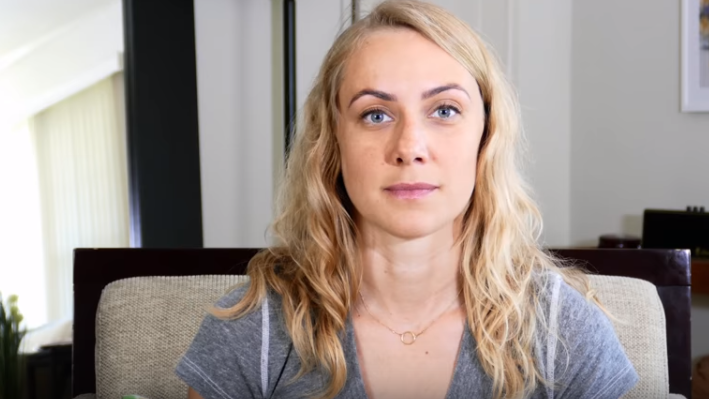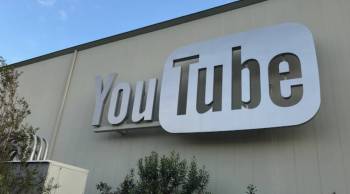Creators have more ways to make a living than just YouTube

There are a lot of ways to have a career on YouTube that go beyond cat videos or comedy. Kati Morton found that out when she started uploading videos about mental health. She’s a licensed therapist and had a private practice. But over the past eight years, she’s shifted almost entirely away from seeing individual clients to bring her expertise to the masses via YouTube. Her channel has about 1,200 educational videos on mental health.
Marketplace’s Jed Kim met up with her at VidCon, the huge annual gathering for content creators in Anaheim, California. He asked her about making a living as a creator while navigating YouTube’s constantly shifting algorithms. The following is an edited transcript of their conversation.
Kati Morton: It’s been tricky. AdSense is how people get paid on YouTube, and a lot of people don’t understand that. Essentially, you get paid per view in some fashion. Let’s say it’s a nickel or something. And that ebbs and flows, especially because my content is kind of sensitive. I deal a lot with demonetization on the platform. YouTube has been great working with me, helping me figure it out, but that means that it’s not so consistent.
Jed Kim: What do you mean by you’ve had issues with demonetization?
Morton: The way that YouTube works on the back end — let’s say you create a video of you building a birdhouse and you put it up. It can take up to 24 hours for YouTube to review it and make sure that it is advertiser friendly. Then ads will run, and then you will get that nickel per view, or whatever. When you’re talking about sensitive content — sometimes I talk about abuse — and they’re like, “That is against our guidelines for advertisers, so you aren’t going to get any monetization, [no] ads run on your video.” So the AdSense for that video — let’s say you made $100 — now you make nothing, or you can do half of it, so maybe you make $50.
Kim: How does that change the way that you decide what kind of content to put out there?
Morton: It really doesn’t. I refuse to let it. With my content, it’s more important that people know [the information]. For instance, I just released a video a week or two ago about abuse and what it’s like to report someone, because most people don’t talk about that and people are retraumatized. And then they don’t know how to deal with that. So I knew when I was creating it, I was like, “It’s not going to be monetized and ‘abuse’ is going to be in the title. But I’ll just eat it, and that’s fine.” And then I have Patreon.
Kim: So Patreon is like another tool that you have, but you still need platforms like YouTube or Instagram to put your content out.
Patreon allows you … to pledge either per video or per month toward that person creating content so they can continue to create content.
Kati Morton
Morton: Correct. And the way that Patreon works is — say we both are huge fans of a TV show. We traditionally don’t have a way to support that TV show other than just watching it. But Patreon allows you as a patron, as a viewer, to pledge either per video or per month toward that person creating content so they can continue to create content. Patreon really allowed me to make the leap and have more consistent income so that my viewers are supporting the content. I’m not waiting for brand deals or AdSense because I also am very protective of my audience.
Kim: What are the different ways you make it work for you?
Morton: I have a ton of different revenue streams. I had a book that came out last year, and that was its own revenue stream and will continue as people purchase the book, hopefully. I speak at schools, and that’s a revenue stream. I speak at different conferences and events. I run CEU courses, which are continuing education units for other therapists. I have merch — I don’t really push it — meaning sweatshirts, posters, jewelry, whatever. You know, “the Kati Morton stuff.” That’s not my main shtick. Also, brand deals as a whole. Online therapy programs such as BetterHelp or Talkspace want to partner with me to tell my audience that they exist. It could be mail-order pharmacies, things like that. There are also grants. I think that’s something that a lot of YouTubers don’t do, but that’s something that I do as an educational creator.
Related links: more insight from Jed Kim
One of the big announcements made at VidCon this year was that YouTube will roll out policies aimed at curbing “creator-on-creator harassment.” The Verge explained that, though it’s not explicitly tied to it, it does come after controversy over YouTube’s perceived bungling of harassment. A conservative pundit made repeated homophobic and racist attacks against a Vox creator. There’s no firm date yet as to when we can expect the new policies to take effect, just that they’re due out this year.
A new study out in JAMA Pediatrics looks at the correlation between screen time and depression in teenagers. Perhaps unsurprising to most is the finding that increased usage of social media and television viewing are predictors of increased depression. Likely causes are the whole everyone-else’s-life-is-better-than-mine effect, as well as the tendency for social media to present us with things that reinforce our downward-spiraling mindsets. What may be more surprising is that increases in video gaming and other computer usage didn’t predict more depression. Not all screen time is as bad as others.
The future of this podcast starts with you.
Every day, the “Marketplace Tech” team demystifies the digital economy with stories that explore more than just Big Tech. We’re committed to covering topics that matter to you and the world around us, diving deep into how technology intersects with climate change, inequity, and disinformation.
As part of a nonprofit newsroom, we’re counting on listeners like you to keep this public service paywall-free and available to all.
Support “Marketplace Tech” in any amount today and become a partner in our mission.























